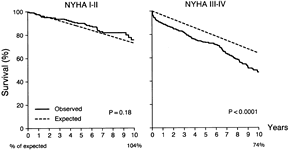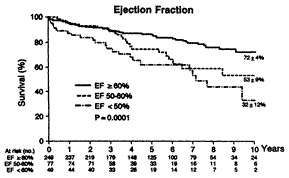Long Term Survival
When interpreting data on long-term survival, it should be appreciated that available data refer to the outcomes of mitral repair and cardiac surgery as practiced 10 to 20 years previously1. Cardiac surgery has, however, since improved in several ways; for example, the widespread adoption of blood cardioplegia has likely reduced the ventricular damage during surgery which in turn will impact long-term survival (as left ventricular function is a major determinant of long-term survival). There is therefore no way of knowing the long-term survival outcomes of mitral valve surgery as currently practiced. Based on existing data, it appears that if surgery is undertaken before onset of symptoms and where left ventricular function is preserved, the life expectancy should be similar to that of the general population2,3,4. When significant symptoms of heart failure have developed (NYHA III – IV) before mitral valve surgery is undertaken, the long term survival is significantly reduced (Figure 1), regardless of the left ventricular function5. Similarly, patients with an impaired left ventricular ejection fraction at time of surgery have a reduced long-term survival (Figure 2).
(*) Modified from Tribouilloy CM, Enriquez-Sarano M, Schaff HV, et al: Impact of preoperative symptoms on survival after surgical correction of organic mitral regurgitation: rationale for optimizing surgical indications. Circulation 99 (3):400-5, 1999. Lippincott Williams & Wilkins
(**) Modified from Enriquez-Sarano M, Tajik AJ, Schaff HV, et al: Echocardiographic prediction of survival after surgical correction of organic mitral regurgitation. Circulation; 90(2):830-7, 1994. Lippincott Williams & Wilkins
- 1Adams DH, Anyanwu A. Pitfalls and limitations in measuring and interpreting the outcomes of mitral valve repair. J Thorac Cardiovasc Surg 2006 March;131(3):523-9.
- 2Enriquez-Sarano M. Timing of mitral valve surgery. Heart 2002 January;87(1):79-85.
- 3Mohty D, Orszulak TA, Schaff HV, Avierinos JF, Tajik JA, Enriquez-Sarano M. Very long-term survival and durability of mitral valve repair for mitral valve prolapse. Circulation 2001 September 18;104(12 Suppl 1):I1-I7.
- 4Braunberger E, Deloche A, Berrebi A et al. Very long-term results (more than 20 years) of valve repair with carpentier's techniques in nonrheumatic mitral valve insufficiency. Circulation 2001 September 18;104(12 Suppl 1):I8-11.
- 5Tribouilloy CM, Enriquez-Sarano M, Schaff HV et al. Impact of preoperative symptoms on survival after surgical correction of organic mitral regurgitation: rationale for optimizing surgical indications. Circulation 1999 January 26;99(3):400-5.

John B. New York
So now, here I am, doing the things that I love to do. I feel great. The results couldn’t have been better, and I’m looking forward to spending more time doing these things, and spending time with my family and friends during my retirement. ”Read Story

